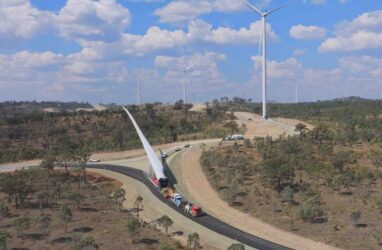Feed aggregator
More cattle kept in UK ‘megafarms’, BBC finds
RSPB criticised by watchdog for accusing politicians of being liars on X
Charity Commission says tweets about environmental protections were inappropriate in ‘tone and nature’
The RSPB has been criticised by the English charities watchdog over social media posts in which it accused named government ministers of being “liars” for watering down environmental protections.
The Charity Commission said the tweets a year ago were “inappropriate” in “tone and nature”, they had not been signed off at the correct level and the RSPB could have done more to prevent them going out.
Continue reading...Australia’s biggest wind farm enters grid management system after delays and cancellations
The post Australia’s biggest wind farm enters grid management system after delays and cancellations appeared first on RenewEconomy.
Canada’s 2023 wildfires produced nearly a decade’s worth of blaze emissions
Fires made at least three times more likely by climate crisis and emitted about 2bn tonnes of CO2, data reveals
Canada’s “record-shattering” wildfires last year produced nearly as much greenhouse gas emissions in one season as would be expected over a decade of fires in normal circumstances, data has shown.
The fires, in Canada’s “wildest season ever”, were made at least three times more likely by the climate crisis, and produced about 2bn tonnes of CO2, about a quarter of the total global emissions from wildfires last year, according to data in the State of Wildfires report, published on Wednesday.
Continue reading...Two polar bears kill Canadian worker in rare attack
The future of solar could be over our highways and up our walls
The post The future of solar could be over our highways and up our walls appeared first on RenewEconomy.
Wild genes in domestic species: how we can supercharge our crops using their distant relatives
‘The dumbest climate conversation of all time’: experts on the Musk-Trump interview
Trump talked about ‘nuclear warming’ while Musk said the only reason to quit fossil fuels is that their supply is finite
Donald Trump and Elon Musk both made discursive, often fact-free assertions about global heating, including that rising sea levels would create “more oceanfront property” and that there was no urgent need to cut carbon emissions, during an event labeled “the dumbest climate conversation of all time” by one prominent activist.
Trump, the Republican US presidential nominee, and Musk, the world’s richest person, dwelled on the problem of the climate crisis during their much-hyped conversation on X, formerly known as Twitter and owned by Musk, on Monday, agreeing that the world has plenty of time to move away from fossil fuels, if at all.
Continue reading...World Bank issues bond linking financial return to carbon removals from Amazon reforestation
BRIEFING: Australia must move fast to capture A$250 bln green iron opportunity
UK regulator approves low-carbon electricity ‘superhighway’ between Scotland and England
Arctic’s carbon sink declines as coastal permafrost erodes -study
Urban birds are teeming with antibiotic-resistant bacteria, study finds
Exposure to bacteria in landfill sites and polluted rivers may explain prevalence among city-dwelling birds
Urban ducks and crows might offer us a connection to nature, but scientists have found wild birds that live near humans are more likely to harbour bacteria resistant to important antibiotics.
Antimicrobial resistance (AMR) is largely caused by the overuse of drugs such as antibiotics among humans and livestock.
Continue reading...Toyota hybrid among cars found to guzzle more petrol than advertised, study finds
Corolla Cross hybrid 2024 used 4.5 litres of fuel per 100km, 7% more than Toyota advertised, while Audi and Subaru models used less
Australians are buying cars that consume more petrol than the fuel efficiencies marketed to them, repeated investigations have found, while many vehicles also emit more toxic fumes than manufacturers advertise.
The Australian Automobile Association (AAA) on Wednesday released the latest results from its “real-world” testing program, a four-year $14m government-funded scheme that compares the fuel consumption and emissions of vehicles in Australian driving conditions with the consumption each vehicle advertises.
Continue reading...




